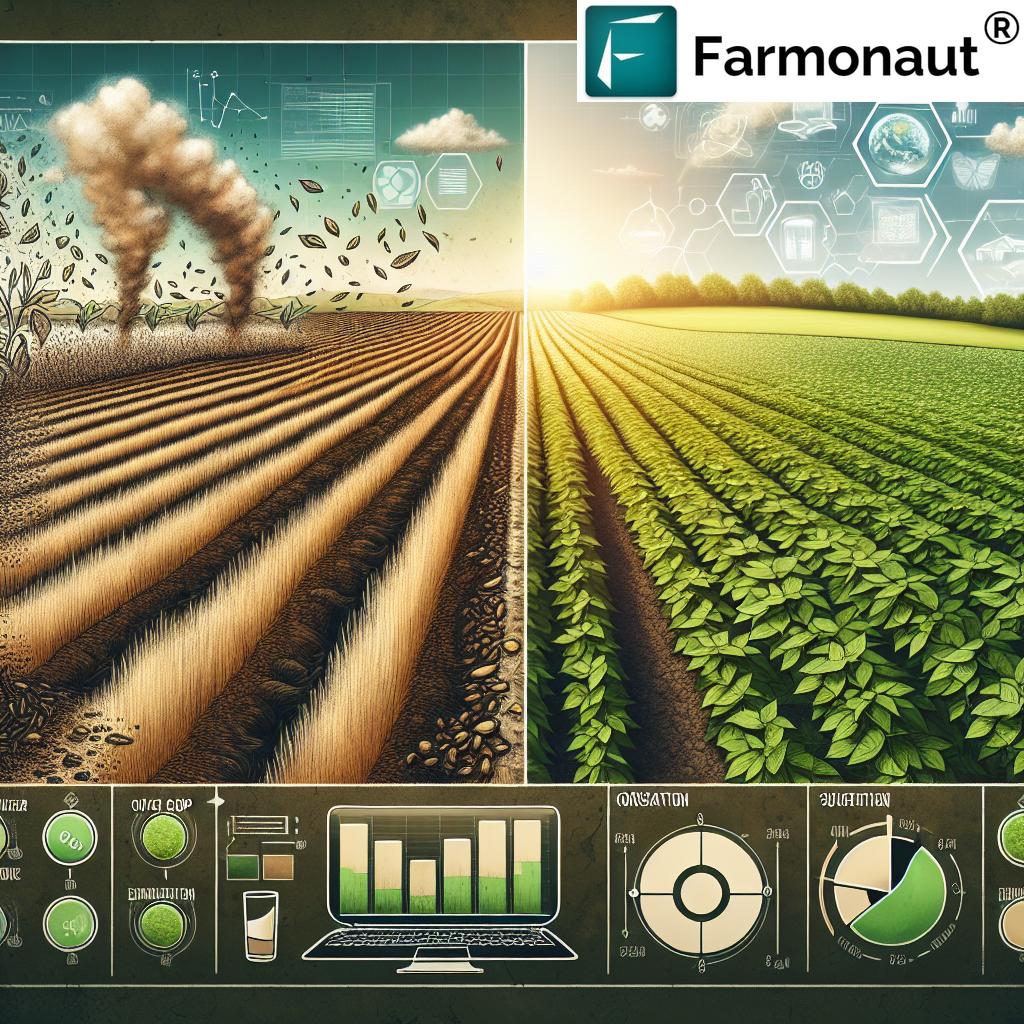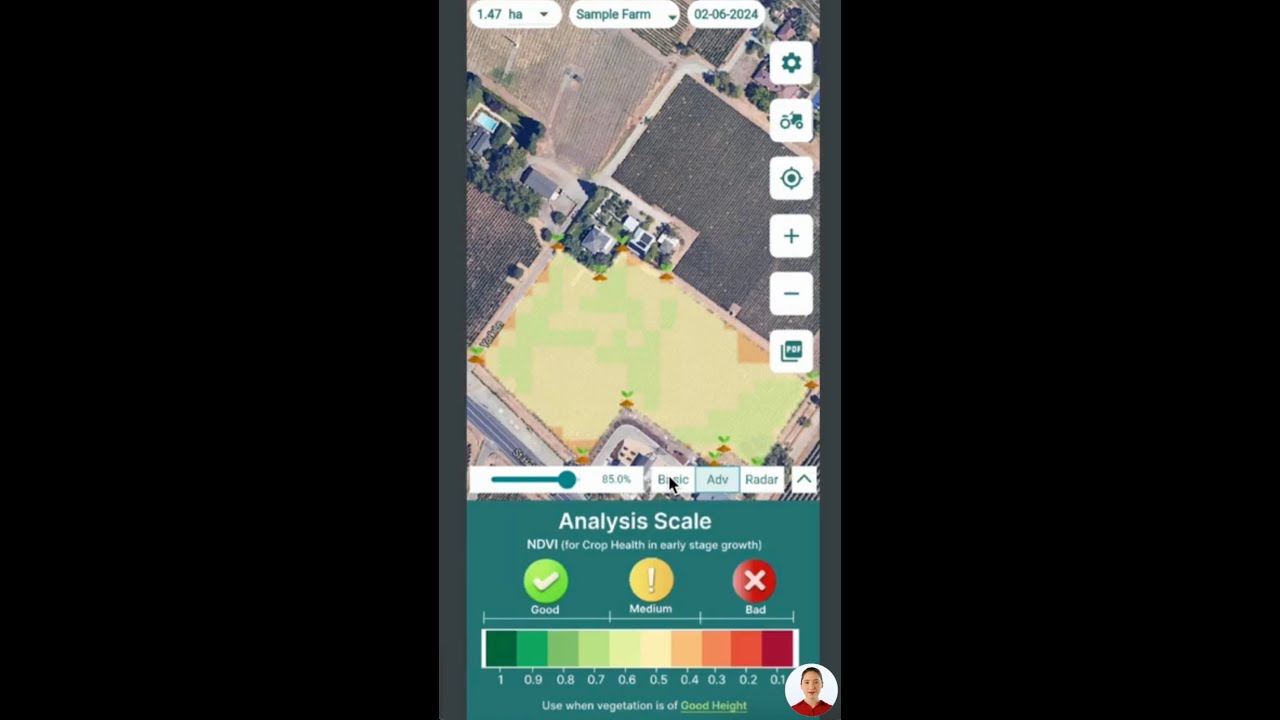Revolutionizing Iowa Soybean Farming: Sustainable Practices to Boost Yields and Slash Emissions by 33%
“Sustainable soybean farming practices can reduce nitrous oxide emissions by 33% while simultaneously increasing crop yields.”
In the heartland of America, Iowa’s soybean fields are undergoing a revolutionary transformation. We’re witnessing a paradigm shift in sustainable soybean farming practices that promise not only to boost yields but also to significantly reduce greenhouse gas emissions. This groundbreaking research challenges long-held beliefs about legume crops and their environmental impact, offering hope for a more sustainable future in agriculture.
At Farmonaut, we’re committed to harnessing the power of technology to support farmers in their journey towards more sustainable and productive farming practices. Our satellite-based farm management solutions provide valuable insights that can help implement and optimize these innovative approaches.

Unveiling the Hidden Emissions in Soybean Farming
Recent research from Iowa State University has shed light on a surprising source of emissions in soybean farming. Contrary to popular belief, significant nitrous oxide emissions—approximately 40% during the soybean year of a typical corn-soybean rotation—stem from natural soil processes rather than nitrogen fertilizer application.
This revelation challenges the conventional wisdom that leguminous crops like soybeans are inherently low in emissions due to their nitrogen-fixing abilities. Despite the absence of additional nitrogen fertilization, these crops continue to emit nitrous oxide, a potent greenhouse gas, primarily due to microbial processes in the soil.
Understanding the Root Cause
- Soil microbial activity peaks in spring
- Inefficient nitrogen management in bare soil
- Natural decomposition processes contribute to emissions
The culprit behind these emissions is the inefficient nitrogen management resulting from the absence of living plants during certain periods. When soil remains bare, particularly in spring, the combination of soil moisture and rising temperatures stimulates microbial activity. This activity, coupled with the lack of plants to utilize the nitrogen, leads to increased nitrous oxide production.
A Two-Pronged Strategy for Sustainable Soybean Farming
To address this challenge, researchers have proposed a innovative two-pronged approach:
- Winter Cover Crops: Implementing winter cover crops, such as oats or rye, sown aerially into mature corn fields.
- Early Soybean Planting: Adopting extended-growth soybean varieties for earlier planting in the spring.
This strategy aims to reduce emission levels during the soybean year by 33% while potentially increasing overall soybean yields by 16%, according to crop-system modeling. These methods present a practical and scalable solution that farmers can adopt without substantial changes to their operations.
At Farmonaut, our satellite-based crop health monitoring system can help farmers track the progress of their cover crops and early-planted soybeans, ensuring optimal growth and resource management. Learn more about our solutions by visiting our web application.

The Science Behind Sustainable Soybean Farming
To fully appreciate the impact of these sustainable practices, it’s essential to understand the science behind them:
- Nitrogen Cycle in Soybean Fields: Soybeans, being legumes, can fix atmospheric nitrogen. However, this process doesn’t eliminate nitrous oxide emissions entirely.
- Soil Microbial Processes: Microbes in the soil play a crucial role in nitrogen transformation, which can lead to nitrous oxide production.
- Cover Crop Benefits: Winter cover crops help manage soil nitrogen, reduce erosion, and improve soil structure.
- Early Planting Advantages: Planting soybeans earlier extends the growing season, allowing for better nitrogen utilization and potentially higher yields.
Our Jeevn AI Advisory System at Farmonaut can provide personalized recommendations based on these scientific principles, helping farmers optimize their soybean farming practices for both yield and sustainability.

Optimizing Corn-Soybean Rotation
“Combining winter cover crops with early soybean planting optimizes corn-soybean rotation, enhancing soil health and reducing greenhouse gas emissions.”
The corn-soybean rotation is a cornerstone of Midwest agriculture. By implementing the proposed sustainable practices, farmers can optimize this rotation for both environmental and economic benefits:
- Improved soil health through year-round plant cover
- Enhanced nutrient cycling and organic matter build-up
- Reduced soil erosion and improved water quality
- Potential for higher yields in both corn and soybean crops
Farmonaut’s satellite-based monitoring can help track these improvements over time, providing farmers with valuable data to refine their practices continually.
The Role of Crop Insurance in Sustainable Farming
Recent adjustments to federal crop insurance policies by the USDA have moved the earliest planting dates for soybeans forward by about a week. This change aligns with the researchers’ findings that earlier planting can yield both environmental and agricultural benefits.
Currently, soybeans in most of Iowa are insured if planted on or after April 15. This policy shift supports the adoption of sustainable practices by reducing the financial risk for farmers who choose to plant earlier.
Farmonaut’s blockchain-based traceability solutions can help document these sustainable practices, potentially aiding farmers in accessing specialized insurance products or sustainability certifications.

Environmental Benefits Beyond Emissions Reduction
While the primary focus of this research is on reducing nitrous oxide emissions, the proposed sustainable soybean farming practices offer a range of additional environmental benefits:
- Improved Water Quality: Cover crops and reduced bare soil periods lead to less runoff and nutrient leaching.
- Increased Soil Organic Matter: Year-round plant growth contributes to building soil organic matter, improving soil structure and water-holding capacity.
- Biodiversity Enhancement: Diverse cover crops can provide habitat for beneficial insects and soil microorganisms.
- Carbon Sequestration: Improved soil health and increased plant biomass can help sequester more carbon in the soil.
Farmonaut’s platform includes tools for carbon footprint tracking, allowing farmers to quantify these additional environmental benefits and potentially access carbon credit markets.
Crop System Modeling for Sustainability
The research team utilized advanced crop system modeling to predict the potential impacts of these sustainable practices. This modeling takes into account various factors such as:
- Soil types and characteristics
- Weather patterns and climate data
- Crop growth parameters
- Nutrient cycling and availability
- Greenhouse gas emission processes
By integrating these complex factors, the models provide valuable insights into the long-term effects of implementing sustainable practices. Farmonaut’s data-driven approach complements these modeling efforts, offering real-time monitoring and analysis to validate and refine the model predictions.
Practical Implementation for Farmers
Adopting these sustainable soybean farming practices requires careful planning and execution. Here are some practical steps farmers can take:
- Select Appropriate Cover Crops: Choose winter-hardy varieties that complement the soybean crop.
- Plan for Early Planting: Prepare fields and equipment for earlier spring planting dates.
- Monitor Soil Conditions: Use tools like Farmonaut’s satellite-based soil moisture monitoring to determine optimal planting times.
- Adjust Nutrient Management: Tailor fertilizer applications to account for the benefits of cover crops and early planting.
- Track Progress: Utilize Farmonaut’s crop health monitoring tools to assess the impact of these practices over time.
By implementing these steps and leveraging technology, farmers can transition to more sustainable practices while maintaining or improving their yields.
The Future of Sustainable Agriculture
The insights gained from this research on sustainable soybean farming practices in Iowa have broader implications for the future of agriculture. As we face the challenges of climate change and increasing food demand, adopting these practices could play a crucial role in:
- Mitigating agriculture’s contribution to greenhouse gas emissions
- Enhancing crop resilience to extreme weather events
- Improving overall farm productivity and profitability
- Preserving soil health for future generations
Farmonaut is committed to supporting this transition to sustainable agriculture through our innovative agtech solutions. Our platform provides the tools and insights needed to implement and optimize these practices effectively.
Comparison of Sustainable Soybean Farming Practices
| Farming Practice | Estimated Yield Impact | Estimated Emissions Reduction | Additional Environmental Benefits |
|---|---|---|---|
| Winter Cover Crops | +5-10% | 15-20% | Improved soil health, reduced erosion, enhanced water quality |
| Early Soybean Planting | +10-15% | 10-15% | Extended growing season, better nutrient utilization |
| Optimized Corn-Soybean Rotation | +15-20% | 25-33% | Improved soil structure, enhanced biodiversity, increased carbon sequestration |
Conclusion: A Path Forward for Sustainable Soybean Farming
The research conducted at Iowa State University has opened new avenues for sustainable soybean farming that promise both environmental and economic benefits. By implementing winter cover crops and adopting early soybean planting, farmers can significantly reduce nitrous oxide emissions while potentially increasing their yields.
These practices, supported by advanced crop system modeling and real-time monitoring tools like those offered by Farmonaut, represent a practical and scalable approach to reducing agriculture’s environmental footprint. As we move forward, the integration of these sustainable practices with cutting-edge technology will be crucial in meeting the dual challenges of food security and environmental stewardship.
We encourage farmers, agronomists, and policymakers to consider these findings and explore ways to implement these sustainable practices. With continued research, innovation, and collaboration, we can create a more sustainable and productive future for soybean farming in Iowa and beyond.
FAQ Section
Q: How does early soybean planting contribute to reducing emissions?
A: Early planting extends the growing season, allowing soybeans to utilize soil nitrogen more efficiently, reducing the potential for nitrous oxide emissions.
Q: Are winter cover crops suitable for all soybean fields?
A: While beneficial in many cases, the suitability of cover crops depends on factors like soil type, climate, and management practices. Farmers should consult local agronomists for specific recommendations.
Q: How can farmers monitor the success of these sustainable practices?
A: Tools like Farmonaut’s satellite-based crop health monitoring can help track vegetation health, soil moisture, and other key metrics to assess the impact of sustainable practices over time.
Q: What are the potential challenges in adopting these sustainable soybean farming practices?
A: Challenges may include initial costs, learning new management techniques, and adapting to different planting schedules. However, the long-term benefits often outweigh these initial hurdles.
Q: How do these practices affect farm economics in the long term?
A: While there may be some upfront costs, the potential for increased yields, reduced input costs, and improved soil health can lead to better long-term profitability for farmers.
By embracing these sustainable practices and leveraging advanced technologies, we can work together to create a more environmentally friendly and productive future for soybean farming. For more information on how Farmonaut can support your journey towards sustainable agriculture, visit our web application or explore our API for custom integration options.


















